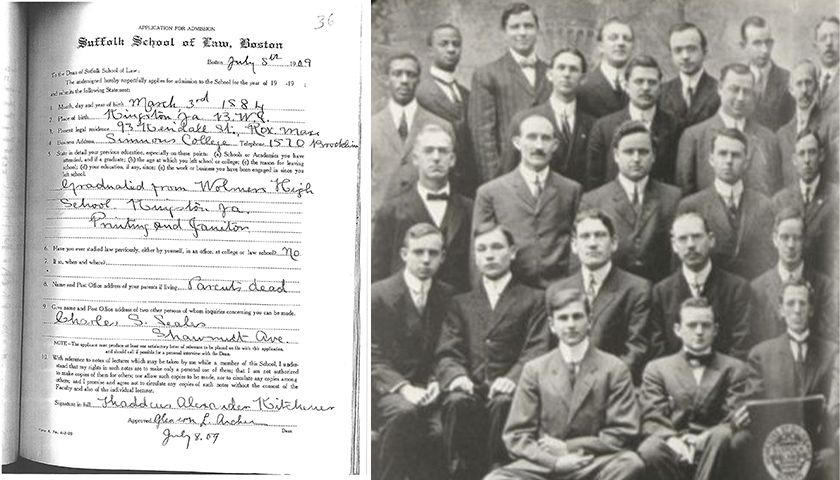Chronicling Boston’s Black Heritage

A lesser-explored chapter of Boston’s Black history is coming to life thanks to a new Moakley Archives’ effort to digitize nearly three decades of the Boston Chronicle, a daily newspaper co-founded by Suffolk University’s first Black graduate.
Known as “the other Black newspaper”—in contrast to the larger and more established Boston Guardian, which published from 1901 through the 1950s—the Chronicle was founded as a daily newspaper in 1915 by a group of West Indian immigrants, including Thaddeus A. Kitchener, a native of Jamaica who graduated from Suffolk Law just two years earlier.
The Moakley Archives has microfilm images of the paper between the years of 1932 and 1960, a few years before it ceased publication, and hopes they will be fully digitized and accessible on the archives’ website for online research by late spring.
In addition to valuable information about long-vanished Black businesses, organizations, social groups, and community leaders, the Chronicle archives contain stories of racial violence—particularly police violence against Black Bostonians—that went unrecorded and uncovered elsewhere. (One headline from November 9, 1938, proclaims “Prominent Dentist Is Given The Works By Police; Hit In Face When He Asks Justice.”)
It also covered Black social life and sports, creating a textured and nuanced record of day-to-day life in Black neighborhoods, says Jennifer Blakely, assistant director of the Sawyer Library, which houses the Moakley Archive.
Once the digital Chronicle archives are available, she says, “people will find so much valuable information they wouldn’t have had access to otherwise. Sadly, many of the things they wrote about—encouraging people to shop at Black-owned businesses, chronicling crimes against Black people, like physical assaults—are still applicable today,” she points out.
“I do think that will be revealing for students or faculty doing research. There’s a lot of ‘We’ve come so far,’ but if you look at it, maybe we really haven’t come as far as we think.”
A first and a founder
The project also paints a fuller picture of Kitchener himself, who was employed as a janitor at Simmons College when he entered Suffolk Law. Following his graduation in 1913, he found himself marginalized by the legal profession, so he continued to support himself as a janitor through the early years of founding the Chronicle.
It was only in 2013 that University Records Manager Michael Dello Iacono, while looking at paperwork and photos from the earliest years of the Law School, discovered that Kitchener was actually Suffolk’s first Black graduate.
For decades, that status had been attributed to Thomas Vreeland Jones, Class of 1915, for whom a scholarship was established in 1981. After the discovery, Suffolk established the annual 1913 Celebration to honor graduates from marginalized communities like Kitchener, whose West Indian heritage may have contributed to his being overlooked for decades by University historians.
History reconstructed
Dello Iacono said the dusty microfiche rolls containing the Chronicle were acquired by a Suffolk librarian from the Boston Public Library in the 1990s.The whereabouts of earlier years of the paper are unknown, he says.
The Depression and World War II-era coverage digitized by Suffolk indicate the paper’s editors were keenly interested in global struggles for racial equality and civil rights—as well as cricket scores, a nod to the Caribbean heritage of many subscribers.
“I would say a lot of influential early Black Bostonians who still haven’t been recognized on a national level are probably featured here,” says Dello Iacono. Another thing that intrigues him are the many classified ads and smaller advertisements. “Somebody could go through these papers and see where all the Black-owned businesses were in Boston, when they shifted from neighborhood to neighborhood, and where they went.”
Library Director Gregory Heald predicts that the Chronicle archives could have a major impact on scholarship in many fields, both local and national. “The archives may turn out to be extremely important,” he says. “It’s got very personal social stuff and club information, as well as much broader political pieces that could help tell part of a story that situates Boston in the broader, more radical wing of Black journalism in the 20th century.”
Contact
Greg Gatlin
Office of Public Affairs
617-573-8428
Erica Noonan
Office of Public Affairs
774-286-9528



